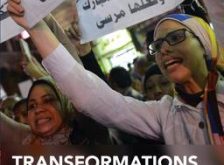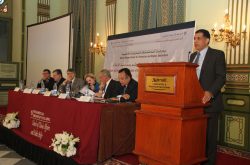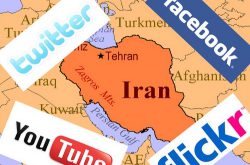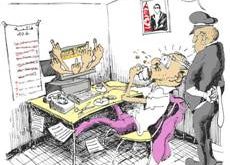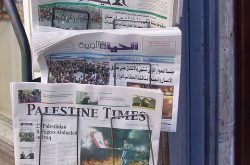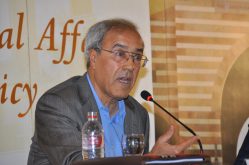Naomi Sakr’s survey of the state of post-revolution Egyptian journalism shows how, in spite of notable advances, it is still beholden to Mubarak-era strictures and practices. Mohammed el-Nawawy calls the book timely and valuable as a snapshot of a transformed but still evolving situation.
Read More »Report: The American University in Cairo’s Conference on Egypt and International Models of Regulation and Accountability
Egypt’s broadcast media is widely seen as unruly and in need of regulation, with the rights and responsibilities of journalists still unclear two years after the revolution. Mark Visonà reports on the recommendations of a recent conference, hosted by the American University of Cairo, on how to build a regulatory framework. The conference, “Egypt and International Models of Broadcast Regulation and Accountability,” featured guest speakers from the United Kingdom, Germany, France, the United States, Tunisia, Libya, and Morocco.
Read More »How Social Media Can Shape a Protest Movement: The Cases of Egypt in 2011 and Iran in 2009
Focusing on the role of social media as a tool for both framing and offline organizing, Felix Tusa compares the Iranian election protests of 2009 with those of the Egyptian revolution of 2011. Unlike Egyptian netizens, Iranians engaged in far less framing and over-relied on social media for organizational purposes, thus partially contributing to the failure of their movement.
Read More »From TUNeZINE to Nhar 3la 3mmar: A Reconsideration of the Role of Bloggers in Tunisia’s Revolution
Amy Kallander delves into the world of Tunisia’s educated and upper-middle class bloggers to reveal a more nuanced picture of their role in the Tunisian revolution. Reviewing the country’s unique history of Internet activism and government censorship, she finds that their impact was not only more limited than western media accounts claimed, but in many ways, more interesting.
Read More »Online Mobilization in Times of Conflict: A Framing-Analysis Perspective
Well before social media’s celebrated role in the uprisings of the Arab Spring, Mohamed Ben Moussa argues, the Internet was shaping collective action and political advocacy in Muslim-majority societies in important ways. Looking at Moroccan social movements’ framing of the 2009 Gaza war online, Ben Moussa details how the use of the Internet shapes their structure, boundaries and mobilization capacity.
Read More »Revolutionary Media on a Budget: Facebook-only Social Journalism
In one of the first studies of Egypt’s Rassd News Network (RNN), Yomna Elsayed explores how this Facebook-based citizen journalism network became the most influential news source during the revolution. Placing RNN in the context of alternative media launched on social networks, she explores the reasons for its success as well as the challenges that it faces.
Read More »Palestine’s Occupied Fourth Estate: An Inside Look at the Work Lives of Palestinian Print Journalists
In a study of three Palestinian newspapers, Miriam Berger identifies both internal and external pressures that profoundly limit the autonomy and development of Palestinian print journalism. In-depth interviews with Palestinian journalists and a focus on their work conditions reveal untold stories about the obstacles and red lines faced on a daily basis.
Read More »Is the Egyptian Press Ready for Democracy? Evaluating Newspaper Coverage as an Indicator of Democratization
Noah Rayman performs a quantitative textual analysis of pre- and post-revolution news coverage in the Egyptian independent newspaper Al-Masry Al-Youm. He finds that the extent of the paper’s post-revolutionary political coverage and social engagement indicate that Egyptian society and media is progressing on the path to democratization, despite the fact that qualitative analysis paints a less optimistic picture.
Read More »Report: The American University in Cairo’s “Tahrir Dialogue: Media Changes in Tunisia after the Revolution” featuring Kamel Labidi
Rasha Allam reports on the efforts of Kamel Labidi, former head of the National Authority for the Reform of Media and Communication, to enact media reform in Tunisia. Two months after Labidi spoke about his work at the American University in Cairo (May 9, 2012), he and his commission resigned, citing a lack of political will for media reform and obstruction from the newly elected Ennahda-led government.
Read More »Book Review: Arab Cultural Studies: Mapping the Field
Ramy Aly reviews and critiques this volume of articles edited by Tariq Sabry, calling it the most coherent attempt yet to “create a reflexive disciplinary self-consciousness” for the nascent field of Arab cultural studies. The book’s strength, he writes, lies in its “unapologetic diagnosis of the weaknesses” of current Arab media, communication and literary studies and its proposals for a way out of this disciplinary impasse.
Read More » Arab Media & Society The Arab Media Hub
Arab Media & Society The Arab Media Hub
